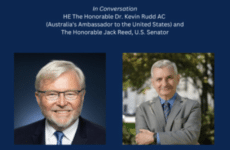BY: PAUL WEST
MCT
WASHINGTON _ Against the backdrop of a sharply polarized nation, the long and mean-spirited 2012 presidential contest is barreling toward the finish with the outcome still in doubt. President Barack Obama and Republican challenger Mitt Romney remain statistically tied in national polling, as they have been for much of the campaign. But the Democratic incumbent is clinging to a marginal advantage in enough key states to make him a slight favorite to gain reelection in a race that could still go either way. Analysts in both parties expect Tuesday's vote to more closely resemble the tight 2000 and 2004 elections, which came down to a single state, rather than Obama's expansive 2008 victory. After years of weak economic growth and stalemate in Washington, opinion surveys show an electorate that is more divided than ever, especially along lines of race, age and party. "We are deeply divided, and that has made a contribution to the closeness of the race. But the public is also divided about these candidates," said independent pollster Andrew Kohut, president of the Pew Research Center. "They look at Romney now as a somewhat acceptable candidate, but they still have doubts about him personally with respect to trustworthiness and with respect to how empathetic he'll be to people like themselves. They also have doubts about Obama and about his ability to turn things around." The future of a divided Congress is also up for grabs. Republicans are virtually certain to keep their majority in the House of Representatives. But barring a late GOP surge at the top of the ticket, Democrats are expected to retain control of the Senate, despite a potential loss of seats. Romney has sought to frame the election around Obama's handling of the economy, and an uptick in the unemployment rate going into the final weekend of the race allowed the Republican to tell voters that joblessness is worse now than when the president took office. At 7.9 percent, unemployment is also the worst for any incumbent seeking reelection since Franklin D. Roosevelt. But improving conditions have increased the public's confidence in the economy, and Obama's job approval rating has reached the 50 percent threshold in many polls, a level close to that of recent presidents who won re-election and higher than for those who were unseated. And while historically high for an Election Day, the jobless rate is substantially lower than it was earlier in Obama's term, giving him room to argue that his policies are slowly working. In a cross-country whirl of rallies this weekend, Obama and Romney tried to rev up the faithful and snatch the potentially crucial votes of late deciders. Their itineraries reflected competing strategies of base mobilization and last-ditch persuasion, but the targets were the same: tossup states from the Mountain West to the Atlantic Coast, with Ohio the most sought-after prize of all. A last-minute shift by Romney suggested that his pathways to 270 electoral votes were narrowing. He left Nevada, a swing-state that appeared to be tilting to Obama, off his flight schedule and instead planned a Sunday rally in the Philadelphia suburbs. No Republican has carried Pennsylvania since 1988, but polls show the race tightening there, and if Romney were to lose Ohio, he would need to take a Democratic-leaning state away from Obama to have a chance of winning. The tossup state of Virginia, another virtual must-win for Romney, was getting more in-person attention from the GOP candidate at the end of the campaign than any other. Romney, promising voters "real change" after "four difficult years," was closing on a relatively positive note. As part of a broader pivot to the center, having run well to the right in the Republican primaries, the former Massachusetts governor was aiming his final message at middle-class swing voters, including struggling single mothers and those working two jobs to make ends meet. But he also continued to batter the president with attack ads, including in Ohio over the federal auto bailout, an Obama decision that is clouding Romney's prospects in a state that is historically a must-win for Republicans. Obama, after canceling several days of partisan events to deal with super storm Sandy and its aftermath, plunged back into campaigning with relish. National polls reflected strong public approval of his handling of the natural disaster, and even some Republican strategists said it had played to his advantage politically. At swing-state rallies, the president accused his GOP challenger of trying to move the country back to George W. Bush-era policies and of "ruling out compromise, pledging to rubber-stamp the tea party's agenda in Congress." "That's not change," he said Saturday in Milwaukee. "Changing the facts when they're inconvenient to your campaign _ that's definitely not change. That's the attitude we need to get rid of." Both sides unleashed final volleys in a brutal air war that set a new standard of negativity for a presidential campaign. Wesleyan University's Media Project said that more than 1 million presidential campaign ads had aired since June 1, most of them negative in tone.














